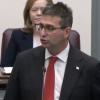Now that summer is more than half over, I am going to give you an idea for those chilly fall nights when you sit around a nice fire and want something to read concerning golf. The name of the book is Golf's Most Wanted, by Floyd Conner. It is a collection of weird golf shots, wild duffers, outstanding golf moments and other oddities that will have you laughing and scratching your head at the same time.
To give you a taste of some of the strange stories, I am going to lag putt to you some of the highlights from the chapter entitled Play for Pay.
Let's start with Arnold Palmer, one of the greatest golfers ever to play the game. He received numerous large paychecks playing the game during his career and millions more as a spokesman for television commercials, but how much do you think he made in his first professional win in the 1955 Canadian Open? He played outstanding golf in the tournament and defeated another top-ranked American named Jack Burke Jr. by five strokes, but did not receive a paycheck for his effort. Why? Because an existing rule stated, "...that a player had to be on tour for six months before he could accept prize money." (No word on who received the money.)
Bobby Jones is a legendary Hall of Fame golfer who founded Augusta National Golf Club and the Masters Golf Tournament. Jones won 13 major championships during his career, including four U.S. Open Championships, three British Opens and golf's Grand Slam in 1930. His total earnings for all those wins totaled zero dollars. Why? Because he never wanted to turn professional and was content to be the greatest amateur in the world. (It also helped that he came from wealth, had a law degree and wanted to spend more time with his family in later life.)
Howard Twitty is not a household name in golf, but he did finish his career with $2 million in prize money and actually won two tournaments. In 1977, he signed a deal with Burger King to place the Burger King logo on his bag and his payment was not in money, but in food. His contract stated that he would be rewarded with 500 Whoppers during his lifetime.
Byron Nelson and Jack Nicklaus, both legendary Hall of Fame golfers, got off to slow starts during their rookie years. Nelson, who won 52 tournaments during his career, made only $12.50 during his first six months as a pro. Nicklaus did a little better, making $33.33 for his first professional paycheck. (Nicklaus did however win over $5 million during his career.)
Sam Snead had two odd paydays during his Hall of Fame career. He won the 1937 Bing Crosby Pro-Am, but refused the crooner's check. He wanted cash instead. Snead went on to win the 1946 British Open and a check for $600, but after expenses of $1000, he was four hundred in the red.
Mickey Wright, Hall of Famer from the LPGA, won 10 tournaments in 1961, including three majors, but since women's golf winners were not paid the same as men, she made only $22, 236.00 (In today's market, she would have made millions.)
And finally, Jacqueline Pung won the 1957 U.S. Women's Open, but was disqualified for signing an incorrect scorecard. The $1,800 first prize money then went to the runner-up, Betsy Rawls. The crowd was so disappointed that someone passed the hat for Pung and she received $2,500 as a consolation. (Strange but true, she lost the tournament, but actually made $700 more than the winner.)
Honorable mention: At the end of 1934, Paul Ryan was the first official money winner on the PGA tour. He won $6,767, but his expenses were $6,765, leaving him a profit of $2. (I wonder if he was audited by the IRS?)
19th Hole Trivia
Roger Maltbie won the 1975 Pleasant Valley Classic and was given a check for $40,000. That night at a bar, he celebrated his victory with drinks for everybody and showed off his check to the crowd. The next morning, when he woke up the check was gone. Embarrassed he had to contact tournament officials and have the check cancelled. (History does not mention if he received a replacement check.)
Gary Player, the ultimate gentleman of golf, won the 1965 U.S. Open and collected his first-place winning of $26,000. Player announced at the trophy presentation that he was giving $5,000 to cancer research, $20,000 to the USGA to promote junior golf and after he paid his caddie $2,000 for toting his bag, he ended up $1,000 in the hole.




















































